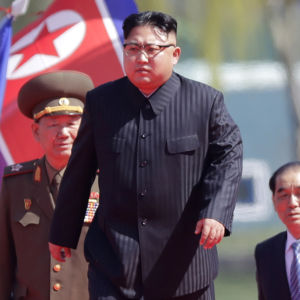SEOUL — As U.N. secretary-general Ban Ki-moon won a reputation for diplomatic blandness, he took pains not to tread on the sensitivities of all the disparate, often hostile, sometimes warring, states that make up the United Nations. That’s not easy considering the explosions, brush fires and bloodletting that goes on every day.
Bearing this background in mind, you had to be impressed by the firmness with which Ban at a lecture that I attended here declared the Korean confrontation is at a “critical stage” and North Korea’s leader, Kim Jong-un, has not done much about denuclearization. Rather, Kim has in large measure succeeded in convincing people that he showed his desire for peace by suspending nuclear and missile testing and blowing up a site that was already largely destroyed in the North’s disastrous sixth and — it is hoped — last such test in September 2017.
Ban did not hesitate to call for “complete, verifiable, irreversible denuclearization,” even though the Americans have gone easy on that CVID acronym for fear of angering the North Koreans. The term CVID also annoys South Koreans, who pay lip service to denuclearization but see repeated talk about it as an obstacle to dialog.
No sane person should believe that Kim is suddenly going to see the light, give up his nukes and missiles and say fine, now let’s talk sensibly about economic and cultural issues, human rights too. It would be comforting to think that China’s President Xi Jinping advised him to do just that during their talks in Beijing, but really that summit, complete with wives smiling prettily and senior officials bowing and scraping, was all about genuflecting before the Chinese.
Xi undoubtedly does not want a second Korean War, not while his country is still netting about $400 billion annually in exports to the United States over imports and the U.S.-China “trade war” dominates headlines. He figures he can bargain hard, be sure of a huge surplus no matter what, and tamp down signs of his obstreperous North Korean ally ruining everything. For China, the game is to reassure Kim, holding him in line by circumventing sanctions and, yes, why not, urging him to see Trump for their second summit.
For China and North Korea, that’s a win-win strategy. They’re both going to benefit by keeping the peace on the Korean peninsula. Why risk a conflagration that would only waste resources and lives? They are also pretty sure Kim will win if he meets Trump, who professed they “fell in love” during their first summit in Singapore last June and still talks most optimistically about a second get-together. Xi and Kim can keep up the momentum with Trump and maybe reap the dividend of an end-of-war declaration in which Trump would agree the Korean War’s over and why waste money on troops in South Korea.
No, Trump is not likely to order withdrawal of all America’s 28,500 troops right away, but he might want to slash the numbers as an economic measure. Wouldn’t that be a great bargaining tool while trying to get South Korea to ante up more of the cost of American defense?
South Korea already pays an annual bill of close to a trillion won, nearly $1 billion, not counting the payroll for all those soldiers, family members and civilian workers. The Koreans think Trump’s demand for doubling the South Korean outlay is more than ridiculous. It’s endangering the alliance.
Xi and Kim must be delighted to know that U.S.-South Korean talks on a new agreement are going nowhere fast. The topic had to have come up in Beijing, maybe between the North Korean and Chinese defense ministers.
With Trump practicing “the art of the deal,” Kim’s got yet another button to push. He can count on Trump’s desire for a vast reduction in costs to the United States. Imagine Kim telling Trump, “Mr. President, sign this end-of-war declaration and you won’t need those bases. You can bring your troops home right now!”
From what we’ve seen of Trump, he’s just dumb enough to fall for it — and the hell with denuclearization.

